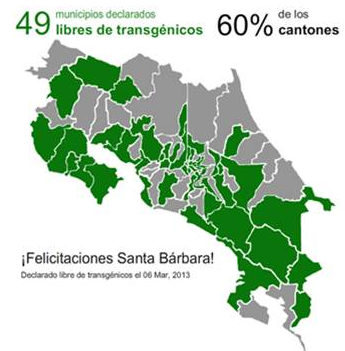Over the past weekend, in the sleepy rural village of Atenas, Costa Rica, there was a weekend-long celebration in the town square.
But instead of the normal summer festivals, or an observance of the Lenten season for this predominantly Catholic nation, citizens were gathering for a different reason: Their canton (akin to a county in the United States) had just voted against the use of genetically modified seeds.

Source: Author’s photograph. These displays were made by local school children to highlight the diversity of native seeds available to farmers in the region.
A little background
The recent backlash against GMOs and the company that predominantly sells them, Monsanto Company (NYSE:MON) , began in late 2012, when a subsidiary of the company requested permission to plant about 5 acres of corn with genetically modified seeds produced by Monsanto Company (NYSE:MON).
The request led to a rash of demonstrations across the country, but on Jan. 22, the Costa Rican Ministry of Science and Technology granted the request.
This isn’t the first time such a request has been granted, as the country has already allowed about 1,100 acres of genetically modified cotton, soybeans, bananas, and pineapples to grow within its borders.
It’s important to note two things: 1,100 acres represents an infinitesimal percentage of total land available for farming in Costa Rica; and none of the genetically modified products are allowed to be consumed or marketed within the country — they are for producing seeds to export or for research purposes only.
A brewing storm
As soon as word got out that Monsanto Company (NYSE:MON) had been granted this exception, several groups began weighing in against the company. Besides environmental groups, the agricultural and biology departments at the University of Costa Rica, as well as the Costa Rican Agronomy Engineers’ Association, wrote letters warning of the inherent dangers of using seeds provided not by nature, but by scientists working in labs.
Many concerned parties began to mobilize to squash any attempt to bring genetically modified seeds into the country before a steady movement in that direction materialized.
Local cantons began voting in earnest to let their voice — and, if obeyed, their laws — be known. In fact, on the very same day Monsanto was granted its permission, the municipalities of Aserri, San Jose, and San Rafael de Heredia announced that GMOs would not be allowed in their soil.
Since then, the response has been clear and direct. Of the country’s 81 cantons, 60% — or 49 in total — have voted to make it illegal to plant GMOs within the Canton lines. Keep in mind that most of this has transpired in just the past three months!

Source: Bloqueverde.blogspot.com
What it means for Fools
Obviously, not every country is going to have as direct a reaction to Monsanto Company (NYSE:MON) — or any other company pushing GMOs — as Costa Rica has. And also keep in mind that Costa Rica’s market potential pales in comparison with that of the United States and other nations around the world.




